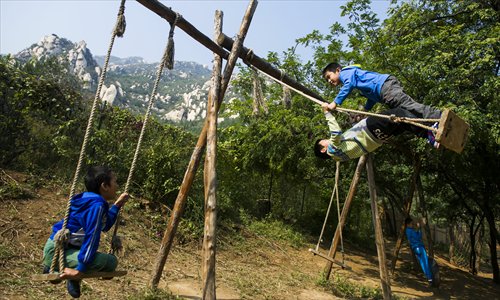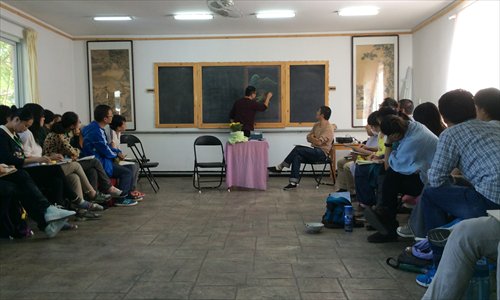HOME >> CHINA
Experimental school draws both praise and scepticism
By Portrait Magazine – Global Times Source:Global Times Published: 2015-11-2 20:03:01

Students frolic in the playground of a Waldorf School in Beijing's Haidian district in 2014. Photo: Li Hao/GT

Teachers in a Waldorf School in Xinzhuang village, Changping district have training in September, 2014. Photo: Chen Ximeng/GT
When Li Jiangnan, a mother of two sons, decided to quit her job of 12 years and move to a small village in northern Beijing for her children's education, she turned to a fortune teller for advice.
The fortune teller told her that her decision was correct. The fortune teller said that Xinzhuang village, which is close to water, is the right place for her family. It is a remote village located at the north end of the central axis of Beijing, home to 300 households who mostly make a living planting strawberries.
Three years ago, the Waldorf School moved to this village in Changping advocating concepts that develop students' bodies and souls. Since then, about 180 middle-class families have given up their chance to send their children to urban schools, their large houses, even their stable jobs to move to this village, believing their children can find love and freedom at this school.
After Li's son was given detention by the teacher in an urban kindergarten, she decided to make a move.
At the Waldorf School, students can climb trees and attend lectures delivered by masters of Chinese culture while parents can sit together, singing songs and playing musical instruments. "Living there is like you are being nourished. You can find what you want from the community," said Li.
However, despite the school's comfortable environment and relaxed atmosphere, many parents have grown sceptical of its methods as they began to worry that their children will be less competitive in later life than those who receive a traditional education.
The school's headmaster declined an interview request from the Global Times on Monday.
Love and freedom
Seven years ago, He Xiaoyan met a teacher from Taiwan at a gathering who advocated Waldorf's style of education and she was impressed by the philosophy. "Love, freedom… it taught us how to take care of our children physically and mentally," she said.
She finally decided to move to the village when her son was in third grade.
Her decision was rejected by her husband at first, who claimed that it was not necessary to move to such a remote school and pay its 24,000 yuan ($3,794) annual tuition fees.
However, after seeing that her son was subject to rude treatment at his urban school, He firmly believed that her son could only find love and freedom in education at the Waldorf School.
There are nearly 700 Waldorf Schools globally, which emphasise exploring human potential and imagination in learning. In 2004, China's first Waldorf School was set up in Chengdu, Sichuan Province and currently nearly 200 Chinese kindergartens and primary schools are advocating Waldorf education.
The school in Xinzhuang, established in 2009, is the first Waldorf School in Beijing. Although it has not been included into the city's official education system, it attracts lots of middle-class parents who are anxious about their children's education and are willing to invest their time and money.
Soil and life
After moving to the village, Li gave away her televisions as the school is strongly against students reading Chinese characters, watching TV or playing with toys.
At the school, there is no sports equipment and no examinations. Instead, students can play on the wooden swing, wooden slide and green grasslands and with soil.
"My child is over 6 years old but he knows nothing about Chinese characters except his name," said Li's husband. The school also teaches students music and painting and drama.
However, with conflicts frequently occurring between teachers and students, many parents fell into a dilemma between the Waldorf's philosophy and social pressures.
One mother He Jing, also had to deal with the conflicts between her son and the teacher, who her son said was "preachy."
Her boy, who was in the seventh grade, told her in July last year, "I do not want to go to school, I do not like it." He then dropped out of the school for five months, but eventually returned.
Portrait Magazine - Global Times
Newspaper headline: Alternative academy
Posted in: Society